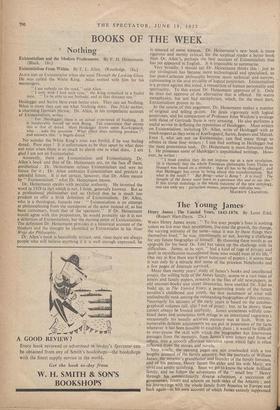BOOKS OF THE WEEK
Nothing
Existentialism From Within. By E. L. Allen. (Routledge. 18s.) ALICE met an Existentialist when she went Through the Looking Glass. He was called the White King. Alice waited with him for his messengers.
" 1 see nobody on the road," said Alice.
" I only wish I had such eyes," the King remarked in a fretful tone. " To be able to see Nobody, and at that distance too."
Heidegger and Sartre have even better eyes. They can see Nothing. What is more they can see what Nothing does. Das Nicht nickel, a charming German phrase. Dr. Allen, in his sympathetic account of Existentialism, writes : " For [Heidegger] there is an actual experience of Nothing. It is inseparably bound up with Being. The experience that attests this is that of dread. Here Heidegger draws upon Kierkegaard, who ... asks the question ' What effect does nothing produce ? ' and answers that it begets dread.'
No wonder the White King's tone was fretful, if he was feeling dread. Poor man ! It is unfortunate to be thus upset by what does not exist when there is so much to alarm one in what does. I am glad ,I am not an Existentialist. • Assuredly, there are Existentialists and Existentialists. Dr. Allen's book and that of Dr. Heinemann are, on the face o7 them, antithetical : Dr. Heinemann refutes Existentialism and sees no future for it ; Dr. Allen embraces Existentialism and predicts a splendid future. It is not certain, however, that Dr. Allen means by " Existentialism " what Dr. Heinemann means.
Dr. Heinemann speaks with peculiar authority. He invented the word in 1929 (a fact which is not, 1 think, generally known). But as a professional philosopher and an Oxford don he is much too prudent to offer a brisk definition of Existentialism. Dr. Allen, who is a theologian, hazards one : " Existentialism is an attempt at philosophising from the standpoint of the actor instead of, as has been customary, from that of the spectator." If Dr. Heinemann would agree with this proposition, he would probably say it is not a definition of ExiStentialiSm, but the starting-point of Existentialism. The definition Dr. Heinemann provides is a historical account of the thinkers and the thought he identified as Existentialist in his Neue Wege der Philosophic. Dr. Allen's book is beautifully written, and, since there are always people who will believe anything if it is well enough expressed, he
is assured of some success. Dr. Heinemann's new book is more rigorous and sternly critical, for the sceptical reader a better book than Dr. Allen's, perhaps the best account of Existentialism that has yet appeared in English. It is impossible to summarise.
Very broadly, I should say Dr. Heinemann thinks this : just as our civilisation has become more technological and specialised, so has post-Cartesian philosophy become more technical and narrow, culminating in the arid triviality of logical positivism. Existentialism is a protest against this trend, a reassertion of human personality and spirituality. To this extent Dr. Heinemann approves of it. Only he does not approve of the alternative that is offered. He wants metaphysics, but not bad metaphysics, which, for the most part, Existentialism proves to be.
In the course.of this argument, Dr. Heinemann makes a number of original and telling points. He deals vigorously with logical positivism, and his comparison of Professor John Wisdom's writings with those of Gertrude Stein is very amusing. He also performs a useful service in deflating the reputation of Heidegger. Most writers on Existentialism, including Dr. Allen, write of Heidegger with as much respect as they write of Kierkegaard, Sartre, Jaspers and Marcel. Even I, who am not an Existentialist, can find many things to admire in these four writers ; I can find nothing in Heidegger but the most pretentious tosh. Dr. Heinemann is more fortunate than I. He possesses some of Heidegger's unpublished writings. How- ever, he writes : " I must confess they do not impress me as a new revelation. [It is claimed] that the whole European philosophy from Thales to Husserl was based on a mistake ; that all has to be changed ; and that Heidegger has come to bring about this transformation. But what is the result ? 'But Being—what is Being? It is itself The thought of the future must learn to experience this and to say this.' If this trivial tautology is the whole outcome of the new ontology, one can only say : parturiunt mantes, peperitque ridiculus mus."
MAURICE CRANSTON.


















































 Previous page
Previous page